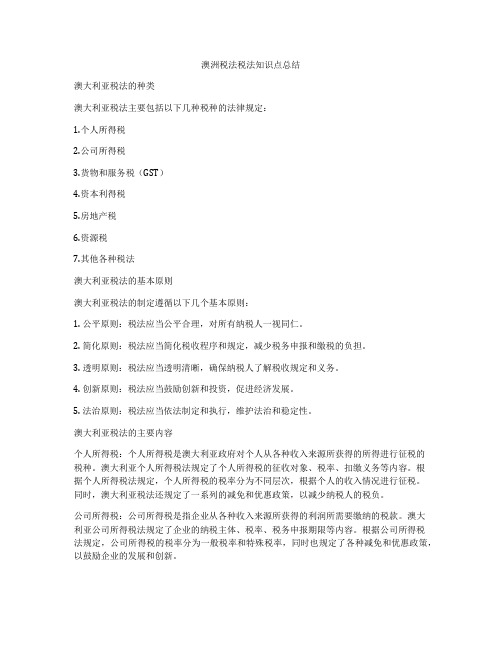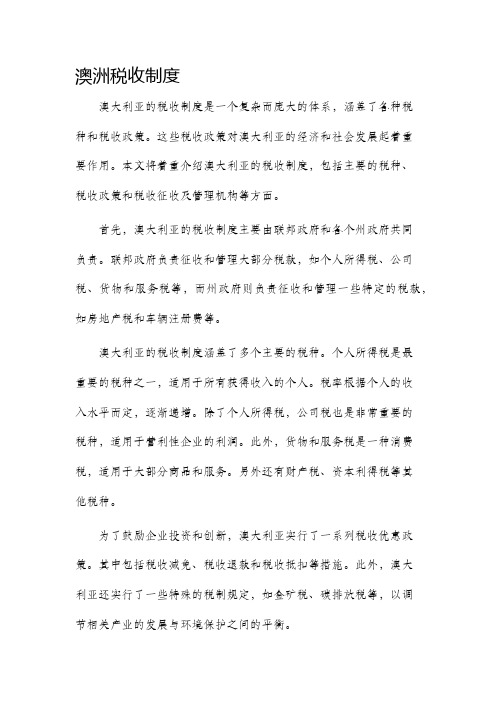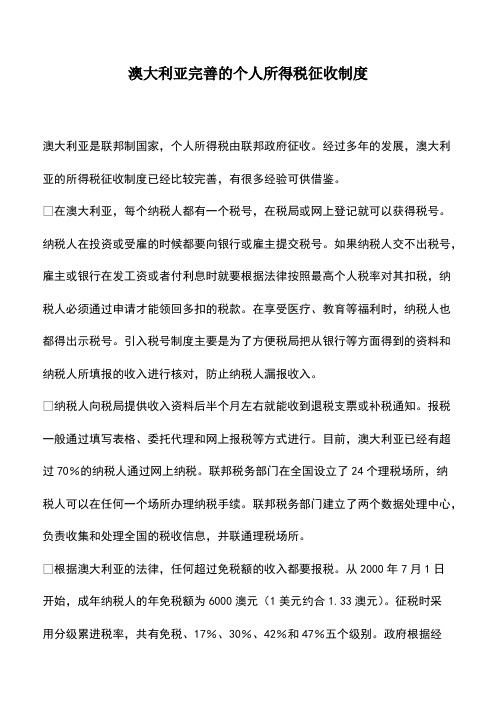Australian taxation law notes 澳大利亚税法概要
Australian taxation law notes 澳大利亚税法概要

Topic 2 Ordinary Income1.Assessable income = ordinary income + statutory income (s. 6-1(1))Taxable income = assessable income - deduction (s. 995-1(1) & s. 4-15)2.Ordinary income: a. Periodicity, recurrence & regularity (Harris, Dixon)b. Income must be money or convertible into moneyc. Receipts from income producing activities will be regarded as ordinary income &income earning activity (Harris, Dixon)3.Income earning activities: a. Personal exertion (personal services, employment, one-off services)b. Property (interest, rent, dividend)c. Carrying on a business (sales, services)4.S. 21A enables value of benefit, non-cash benefit, to be assessed as ordinary income under s. 6-5.FCT v Cooke & Sherden5.S.21A does not operate in an employment relationship. If employment, the benefit is taxed under FBT.6.Non-cash benefit: property or services provided wholly or partly in respect of a business relationship,or for or in relation directly or indirectly to a business relationship. S. 21A(5)7.S. 21A(3): the value of the benefit is reduced to the extent that the taxpayer would have been entitledto a once only deduction if the taxpayer had incurred the cost.8. Entertainment is non-deductible per s. 32-5.9. If a receipt is ordinary income under s. 6-5, a receipt that substitutes for it will also be ordinary income under s. 6-5.FCT v Dixon 10.Receipts generally not considered as ordinary income include capital, windfall gains, hobby receiptsand mutual receipts.11.Purely gift from friend or family cannot be treated as ordinary income.FCT v Harris 12.The compensation for the cancellation of business contracts is income.Heavy Minerals Pty Ltd v FCT 13.Amount received for the sterilisation of assets are treated as capital (loss of use of asset or incomeproducing capacity).Glenboig Union Fireclay Co Ltd v IRC14. Payments received for entering into restrictive agreements are capital.Dickenson v FCT 15. Compensation for loss of trading stock is considered as income.CIR v Newcastle Breweries Ltd 16. Sales of knowledge or ‘know-how’ are income.Rolls-Royce Ltd v Jeffrey 17.Sale or assignment of income streams should be treated as income, and the lump sum is assesableunder s. 25(1).Myer Emporium 18.Undissected lump sum, where lump sum amounts comprising both income and capital, but withoutdissection into their actual components, should be treated as capital.Mclaurin v FCT19. Lottery prize are not income in the Australian jurisdiction.20. Gambling wins will only constitute deduction and assessable income, if they may be seen as proceedsof a business.Trautwein v FCT21. Receipts form gambling wins are not assessable. (Martin v FCT)22.No liability to tax arises where a person participates casually in a competition and wins a prize.However, a professional quiz player regular appearances on quiz programs the prizes may constitute assessable income.Case T14 23.Receipts or proceeds form hobbies, as distinguished from business, are deemed not to be assessableincome. Also, expenses and losses from hobbies are not deductibel.anizations have no identity separate from their members, thus subscriptions and othercontributions form members cannot be treated as income, they are mutual in character.The Bohemians Club v Acting FCT 25. Income from illegal activities are assessable.Partridge v Mallandaine 26. Profits arising from ultra vires actions of company directors may be assessable of the company.England v WebbTopic 3 Derivation of Income1.S 6-5(2) & (3): assessable income include ordinary income derived during the income year.2.The cash basis: used mostly by individuals, eg salary or wage earnersThe accruals basis: generally used in business3.Cash basis: income is derived when the cash is received.Brent v FCT Accruals basis: the income is derived when it has been earned, when an invoice has been issued.J Rowe & Son v FCT 4. Large chartered accounting firm should use accruals basis, because the income is not personal services income, it is the result of many accountants.Henderson v FCT 5. The income derived by a solicitor in sole practice with one secretary should be treated as personalservices income and cash basis appropriate.FCT v Firstenberg 6.Services can be provided by many people - AccrualServices provided by one person - CashSelling shoes by one or many people - trading business - AccrualIncome from rental property - Cash7.For a business selling goods or supplying services, amounts received in advance are not regarded asincome.Arthur Murray v FCT 8.S. 6-5(4): the case where the taxpayer, though he has not received the money itself, has had the benefitof it, or of something which is substantially equivalent to it. (cash basis only)9. Brent v FCT: Wife of the Great in not in business instead providing personal services - Cash basisS. 6-5(4) did not apply, and only the money actually received was derived.10. Asking for a cash payment to be delayed is not dealing with the income. (cash basis only)Brent v FCTTopic 4 Statutory Income and Exempt Income1.Dividends paid by a company to a shareholder are included in the shareholder’s assessable incomeunder s. 44(1).2.Tax paid on the profits from which a dividend was paid and passed onto the shareholder is alsoassessable under s. 207-20(1), which is called ‘franking’.从税后利润付股利给股东,这部分利润所含的已交公司所得税称为franking credit。
澳大利亚税制及其税收政策(下)

91 ・
Ju a f a sa o rm oeg i rtrso c n mis o r lo n lt nfo F rin L t aue fE o o c n Tr i e
维普资讯
表 l 联 邦税 奉行 成本 2 个人 纳税 人 企 业 纳 税 人 所 有纳 税 人
与 其 他 国家 学 者 的 研 究 结 果 大体 相 同。
表 1 消 费 税 改 革 产 生 的 效 率 提 高 :90 9 1 19 / 1年 度
来 源 :hs l ( 9 ). 1 Ci o 1 3 表 4 hm 9
税 制 运 行 过 程 中产 生 的第 三 项 损 失 是 纳 税 人 的 奉 行 成 本 。表 1 2给 出 了 19 / 5年 度 联 94 9 邦 税 收 奉 行成 本 的详 细 数 据 。 它 大 约 相 当于 税 收 收入 的 7 0 。 .%
尼 尔・  ̄ ( e r n 著 N iWar ) l e 黄 黎 明 葛 夕 良 译
七 泛 深 入 的讨 论 只 有 在 考 虑 了 现 行税 制是 否 符合 一 个 好 的 税 制 的 前 提 下 才 能继 续 进 行 下 去 。对 这 类 问题 的 分 析 有 一 个 重 要 的起 点 , 即我 们 应 该 承认 , 论 从 哪 里 不 开 始 征 税 , 终 所有 税 收 负 担 都 必 须 落 在 家 庭 上 面 。 最 然 而 , 价 税 收影 响 十分 复 杂 。 因 为 税 收 负 担 概 括 起 来 包 含 四个 因 素 : 评
涉 到 税 收 如何 转 移 到家 庭 等 许 多 复 杂 而 且 有 争 议 的 假 定 。 表 9和 表 l O表 明 了 税 收 对 家 庭 影 响 的 重 要趋 势 。 尤 其是 表 9显 示 , 个 税 制 的 累 进 性 主 要 是 由个 人 所 得 税 的 累进 性 造 成 的 。 整 间 接 税 通 常是 累退 的 。
澳洲税法税法知识点总结

澳洲税法税法知识点总结澳大利亚税法的种类澳大利亚税法主要包括以下几种税种的法律规定:1.个人所得税2.公司所得税3.货物和服务税(GST)4.资本利得税5.房地产税6.资源税7.其他各种税法澳大利亚税法的基本原则澳大利亚税法的制定遵循以下几个基本原则:1. 公平原则:税法应当公平合理,对所有纳税人一视同仁。
2. 简化原则:税法应当简化税收程序和规定,减少税务申报和缴税的负担。
3. 透明原则:税法应当透明清晰,确保纳税人了解税收规定和义务。
4. 创新原则:税法应当鼓励创新和投资,促进经济发展。
5. 法治原则:税法应当依法制定和执行,维护法治和稳定性。
澳大利亚税法的主要内容个人所得税:个人所得税是澳大利亚政府对个人从各种收入来源所获得的所得进行征税的税种。
澳大利亚个人所得税法规定了个人所得税的征收对象、税率、扣缴义务等内容。
根据个人所得税法规定,个人所得税的税率分为不同层次,根据个人的收入情况进行征税。
同时,澳大利亚税法还规定了一系列的减免和优惠政策,以减少纳税人的税负。
公司所得税:公司所得税是指企业从各种收入来源所获得的利润所需要缴纳的税款。
澳大利亚公司所得税法规定了企业的纳税主体、税率、税务申报期限等内容。
根据公司所得税法规定,公司所得税的税率分为一般税率和特殊税率,同时也规定了各种减免和优惠政策,以鼓励企业的发展和创新。
货物和服务税(GST):货物和服务税是澳大利亚政府对商品和服务进行征税的税种。
澳大利亚GST法规定了货物和服务的征税标准、税率、申报程序等内容。
根据GST法规定,一般情况下,销售商品和提供服务的企业需要向政府缴纳10%的GST税款。
同时,GST法还规定了各种生活必需品、医疗保健和金融服务等的免税条款,以保障消费者的基本生活需求。
资本利得税:资本利得税是指纳税人出售资产(如房地产、股票等)获得的利润所需要缴纳的税款。
澳大利亚资本利得税法规定了资本利得税的征税标准、税率、税务申报程序等内容。
澳洲税收制度

澳洲税收制度澳大利亚的税收制度是一个复杂而庞大的体系,涵盖了各种税种和税收政策。
这些税收政策对澳大利亚的经济和社会发展起着重要作用。
本文将着重介绍澳大利亚的税收制度,包括主要的税种、税收政策和税收征收及管理机构等方面。
首先,澳大利亚的税收制度主要由联邦政府和各个州政府共同负责。
联邦政府负责征收和管理大部分税款,如个人所得税、公司税、货物和服务税等,而州政府则负责征收和管理一些特定的税款,如房地产税和车辆注册费等。
澳大利亚的税收制度涵盖了多个主要的税种。
个人所得税是最重要的税种之一,适用于所有获得收入的个人。
税率根据个人的收入水平而定,逐渐递增。
除了个人所得税,公司税也是非常重要的税种,适用于营利性企业的利润。
此外,货物和服务税是一种消费税,适用于大部分商品和服务。
另外还有财产税、资本利得税等其他税种。
为了鼓励企业投资和创新,澳大利亚实行了一系列税收优惠政策。
其中包括税收减免、税收退款和税收抵扣等措施。
此外,澳大利亚还实行了一些特殊的税制规定,如金矿税、碳排放税等,以调节相关产业的发展与环境保护之间的平衡。
澳大利亚的税收征收和管理由澳大利亚税务局(Australian Taxation Office,简称ATO)负责。
ATO是联邦政府的税收征收和管理机构,负责征收和管理所有联邦税款。
该机构有权审查纳税人的申报信息,进行税收征收和追缴,确保税收合规性和公平性。
对于澳大利亚境内的居民和企业来说,遵守税收法规是义务和责任。
个人和企业需要按照规定的时间提交纳税申报表,并根据实际情况缴纳相应的税款。
同时,为了保证税收公平性,澳大利亚税务局对纳税人的申报信息进行审核和核实,并进行相应的税务调查。
总的来说,澳大利亚的税收制度是一个相对成熟和完善的体系,为澳大利亚的经济和社会发展提供了重要的财政支持。
通过合理的税收政策和税收管理,澳大利亚通过征收税款来为社会提供公共服务,维护经济平稳发展和社会公平正义。
尽管澳大利亚的税收制度相对复杂,但政府和税务机构通过持续的改革和优化,努力提升税收征收管理的效率和透明度。
澳大利亚增值税计算依据(3篇)

第1篇一、概述增值税(Value Added Tax,简称VAT)是一种按照商品或服务增值额征收的税种。
澳大利亚作为世界上较早实施增值税的国家之一,自1985年7月1日起实行增值税制度。
本文旨在详细介绍澳大利亚增值税的计算依据,以帮助读者更好地理解澳大利亚增值税的征收原则和计算方法。
二、增值税计算依据1. 增值税税率和征收范围澳大利亚增值税的税率为10%,适用于绝大多数商品和服务的销售。
但以下几种情况除外:(1)基本食品:包括新鲜水果、蔬菜、谷物、奶制品、面包、肉类等,税率为0%。
(2)医疗服务:包括医院、诊所、牙科、眼科等医疗服务,税率为0%。
(3)教育服务:包括公立学校、大学、职业教育等教育服务,税率为0%。
(4)住房租赁:包括住宅、公寓、别墅等住房租赁,税率为0%。
2. 增值税计算方法澳大利亚增值税的计算依据为“增值税差额法”,即按照销售额减去进项税额后的差额征收。
具体计算方法如下:(1)销售额:指纳税人销售商品或提供服务的收入。
(2)进项税额:指纳税人购进商品或接受服务时支付的增值税额。
(3)应纳税额:销售额减去进项税额后的差额。
(4)增值税额:应纳税额乘以增值税税率。
例如,某企业销售商品销售额为100万元,其中含税销售额为110万元(即增值税税率为10%)。
该企业购进商品时支付的进项税额为5万元。
根据增值税差额法,该企业应纳税额为(110万元-5万元)=105万元。
增值税额为105万元×10% = 10.5万元。
3. 增值税申报和缴纳澳大利亚增值税的申报和缴纳周期为季度申报,纳税人需在每季度结束后一个月内向税务机关申报并缴纳增值税。
具体操作如下:(1)纳税人在税务机关注册增值税纳税人。
(2)纳税人根据实际销售和购进情况,填写增值税申报表。
(3)税务机关审核纳税人申报的增值税申报表,确定应纳税额。
(4)纳税人按照税务机关核定的应纳税额,在规定时间内缴纳增值税。
三、增值税优惠政策澳大利亚政府为鼓励企业投资和创新,制定了一系列增值税优惠政策。
澳洲工程施工税务(3篇)

第1篇在澳洲进行工程施工,税务问题是一个不容忽视的重要环节。
对于在澳洲施工的企业来说,了解澳洲的税务政策,合理规划税务,不仅可以降低税务风险,还可以提高企业的经济效益。
本文将从以下几个方面介绍澳洲工程施工税务。
一、增值税(GST)澳洲实行增值税制度,工程施工企业在澳洲境内提供的工程施工服务需要缴纳增值税。
增值税税率为10%,部分州和领地还实行不同的增值税率。
增值税的计算公式为:应纳税额=销售额×税率。
1. 销售额:指工程施工企业在澳洲境内提供的工程施工服务的收入。
2. 税率:10%的增值税税率适用于大多数工程施工服务。
部分州和领地实行不同的增值税率,如新南威尔士州为9.5%,南澳大利亚州为10.5%。
3. 减免税:工程施工企业在澳洲境内采购的材料、设备和服务等,如符合相关条件,可以享受增值税减免。
二、企业所得税在澳洲境内设立分支机构的工程施工企业,需要缴纳企业所得税。
企业所得税税率为30%。
企业所得税的计算公式为:应纳税所得额×税率。
1. 应纳税所得额:指工程施工企业在澳洲境内取得的收入减去成本、费用、损失等。
2. 税率:30%的企业所得税税率适用于大多数工程施工企业。
部分州和领地实行不同的企业所得税税率。
三、营业税部分州和领地对工程施工企业征收营业税。
营业税税率根据州和领地的不同而有所差异。
营业税的计算公式为:应纳税额=销售额×税率。
四、其他税务问题1. 预缴税:工程施工企业在澳洲境内从事工程施工活动,需要按照规定预缴税款。
2. 税务申报:工程施工企业需要在规定的时间内向澳洲税务机关申报税务,包括增值税、企业所得税等。
3. 税务审计:澳洲税务机关对工程施工企业的税务情况进行审计,以确保企业依法纳税。
4. 税务筹划:工程施工企业可以通过合理的税务筹划,降低税负,提高经济效益。
总结在澳洲进行工程施工,税务问题关系到企业的经济效益和税务风险。
了解澳洲的税务政策,合理规划税务,对于工程施工企业来说至关重要。
澳大利亚完善的个人所得税征收制度

澳大利亚完善的个人所得税征收制度
澳大利亚是联邦制国家,个人所得税由联邦政府征收。
经过多年的发展,澳大利亚的所得税征收制度已经比较完善,有很多经验可供借鉴。
在澳大利亚,每个纳税人都有一个税号,在税局或网上登记就可以获得税号。
纳税人在投资或受雇的时候都要向银行或雇主提交税号。
如果纳税人交不出税号,雇主或银行在发工资或者付利息时就要根据法律按照最高个人税率对其扣税,纳税人必须通过申请才能领回多扣的税款。
在享受医疗、教育等福利时,纳税人也都得出示税号。
引入税号制度主要是为了方便税局把从银行等方面得到的资料和纳税人所填报的收入进行核对,防止纳税人漏报收入。
纳税人向税局提供收入资料后半个月左右就能收到退税支票或补税通知。
报税一般通过填写表格、委托代理和网上报税等方式进行。
目前,澳大利亚已经有超过70%的纳税人通过网上纳税。
联邦税务部门在全国设立了24个理税场所,纳
税人可以在任何一个场所办理纳税手续。
联邦税务部门建立了两个数据处理中心,负责收集和处理全国的税收信息,并联通理税场所。
根据澳大利亚的法律,任何超过免税额的收入都要报税。
从2000年7月1日
开始,成年纳税人的年免税额为6000澳元(1美元约合1.33澳元)。
征税时采
用分级累进税率,共有免税、17%、30%、42%和47%五个级别。
政府根据经。
澳大利亚如何征个人所得税

澳大利亚如何征个人所得税澳大利亚的个人所得税是根据个人所得收入征收的一种税费。
个人所得税是澳大利亚政府主要的税收来源之一,用于提供公共服务和社会福利。
以下是澳大利亚如何征收个人所得税的主要步骤和原则。
1. 税收层级澳大利亚的个人所得税根据税收层级进行征收。
根据个人收入的不同,税收按照不同的比例进行征收。
澳大利亚的税收层级有以下几个层次:- 0-18,200澳元的年收入,免税- 18,201-45,000澳元的年收入,征收19%的税率- 45,001-120,000澳元的年收入,征收32.5%的税率- 120,001澳元以上的年收入,征收37%的税率2. 税前扣除在计算个人所得税之前,澳大利亚允许一些税前扣除,以减少纳税人的应纳税额。
这些税前扣除可以包括以下方面:- 个人寿险保费- 超级ann(澳大利亚的退休储蓄账户)- 子女教育费用- 慈善捐赠税前扣除的具体金额根据个人的情况和政府的政策来确定。
3. 税务申报每年3月至10月期间,个人需要根据澳大利亚税务局的要求,申报个人所得税。
纳税人可以通过在线申报系统或邮寄方式进行申报。
申报必须包括以下信息:- 个人收入来源和金额- 税前扣除- 其他相关的个人财务信息4. 税务计算和缴纳根据个人所得税申报表提供的信息,澳大利亚税务局会计算个人应缴纳的税款金额。
纳税人需要按照税务局的要求将应缴税款交纳。
通常,税款可以通过以下几种方式进行缴纳:- 银行转账- 信用卡支付- 借记卡支付税款的缴纳截止日期通常在申报期结束后的一段时间内。
5. 税务审查澳大利亚税务局有权对纳税人的申报信息进行审查。
如果发现不符合税法规定的问题,税务局可以要求纳税人提供更多的信息或证明,并可能对申报结果进行调整。
纳税人必须保留与个人所得税申报相关的所有文件和记录,以备税务局审核使用。
总之,澳大利亚个人所得税的征收是根据税收层级进行的。
纳税人需要在申报期内按照税务局的要求进行申报和缴纳税款。
- 1、下载文档前请自行甄别文档内容的完整性,平台不提供额外的编辑、内容补充、找答案等附加服务。
- 2、"仅部分预览"的文档,不可在线预览部分如存在完整性等问题,可反馈申请退款(可完整预览的文档不适用该条件!)。
- 3、如文档侵犯您的权益,请联系客服反馈,我们会尽快为您处理(人工客服工作时间:9:00-18:30)。
Topic 2 Ordinary Income1.Assessable income = ordinary income + statutory income (s. 6-1(1))Taxable income = assessable income - deduction (s. 995-1(1) & s. 4-15)2.Ordinary income: a. Periodicity, recurrence & regularity (Harris, Dixon)b. Income must be money or convertible into moneyc. Receipts from income producing activities will be regarded as ordinary income &income earning activity (Harris, Dixon)3.Income earning activities: a. Personal exertion (personal services, employment, one-off services)b. Property (interest, rent, dividend)c. Carrying on a business (sales, services)4.S. 21A enables value of benefit, non-cash benefit, to be assessed as ordinary income under s. 6-5.FCT v Cooke & Sherden5.S.21A does not operate in an employment relationship. If employment, the benefit is taxed under FBT.6.Non-cash benefit: property or services provided wholly or partly in respect of a business relationship,or for or in relation directly or indirectly to a business relationship. S. 21A(5)7.S. 21A(3): the value of the benefit is reduced to the extent that the taxpayer would have been entitledto a once only deduction if the taxpayer had incurred the cost.8. Entertainment is non-deductible per s. 32-5.9. If a receipt is ordinary income under s. 6-5, a receipt that substitutes for it will also be ordinary income under s. 6-5.FCT v Dixon 10.Receipts generally not considered as ordinary income include capital, windfall gains, hobby receiptsand mutual receipts.11.Purely gift from friend or family cannot be treated as ordinary income.FCT v Harris 12.The compensation for the cancellation of business contracts is income.Heavy Minerals Pty Ltd v FCT 13.Amount received for the sterilisation of assets are treated as capital (loss of use of asset or incomeproducing capacity).Glenboig Union Fireclay Co Ltd v IRC14. Payments received for entering into restrictive agreements are capital.Dickenson v FCT 15. Compensation for loss of trading stock is considered as income.CIR v Newcastle Breweries Ltd 16. Sales of knowledge or ‘know-how’ are income.Rolls-Royce Ltd v Jeffrey 17.Sale or assignment of income streams should be treated as income, and the lump sum is assesableunder s. 25(1).Myer Emporium 18.Undissected lump sum, where lump sum amounts comprising both income and capital, but withoutdissection into their actual components, should be treated as capital.Mclaurin v FCT19. Lottery prize are not income in the Australian jurisdiction.20. Gambling wins will only constitute deduction and assessable income, if they may be seen as proceedsof a business.Trautwein v FCT21. Receipts form gambling wins are not assessable. (Martin v FCT)22.No liability to tax arises where a person participates casually in a competition and wins a prize.However, a professional quiz player regular appearances on quiz programs the prizes may constitute assessable income.Case T14 23.Receipts or proceeds form hobbies, as distinguished from business, are deemed not to be assessableincome. Also, expenses and losses from hobbies are not deductibel.anizations have no identity separate from their members, thus subscriptions and othercontributions form members cannot be treated as income, they are mutual in character.The Bohemians Club v Acting FCT 25. Income from illegal activities are assessable.Partridge v Mallandaine 26. Profits arising from ultra vires actions of company directors may be assessable of the company.England v WebbTopic 3 Derivation of Income1.S 6-5(2) & (3): assessable income include ordinary income derived during the income year.2.The cash basis: used mostly by individuals, eg salary or wage earnersThe accruals basis: generally used in business3.Cash basis: income is derived when the cash is received.Brent v FCT Accruals basis: the income is derived when it has been earned, when an invoice has been issued.J Rowe & Son v FCT 4. Large chartered accounting firm should use accruals basis, because the income is not personal services income, it is the result of many accountants.Henderson v FCT 5. The income derived by a solicitor in sole practice with one secretary should be treated as personalservices income and cash basis appropriate.FCT v Firstenberg 6.Services can be provided by many people - AccrualServices provided by one person - CashSelling shoes by one or many people - trading business - AccrualIncome from rental property - Cash7.For a business selling goods or supplying services, amounts received in advance are not regarded asincome.Arthur Murray v FCT 8.S. 6-5(4): the case where the taxpayer, though he has not received the money itself, has had the benefitof it, or of something which is substantially equivalent to it. (cash basis only)9. Brent v FCT: Wife of the Great in not in business instead providing personal services - Cash basisS. 6-5(4) did not apply, and only the money actually received was derived.10. Asking for a cash payment to be delayed is not dealing with the income. (cash basis only)Brent v FCTTopic 4 Statutory Income and Exempt Income1.Dividends paid by a company to a shareholder are included in the shareholder’s assessable incomeunder s. 44(1).2.Tax paid on the profits from which a dividend was paid and passed onto the shareholder is alsoassessable under s. 207-20(1), which is called ‘franking’.从税后利润付股利给股东,这部分利润所含的已交公司所得税称为franking credit。
